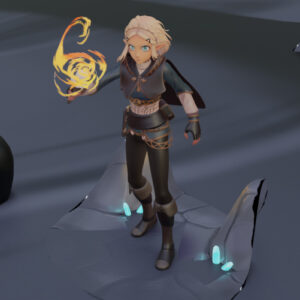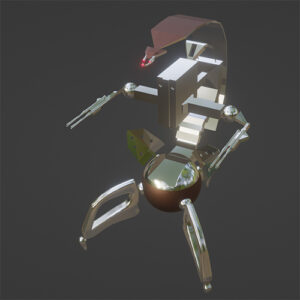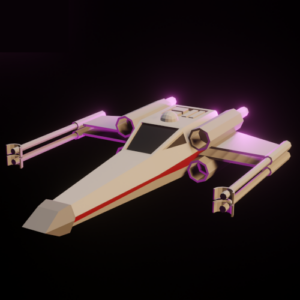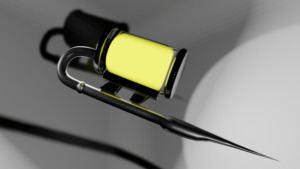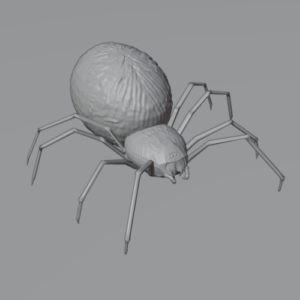Goals
Students will create a more complex mesh model using intermediate modeling techniques.
Skills
- Modifiers: mirror, subdivision surface, boolean, etc
- Proportional editing
- Stitched objects
- Sculpted objects

Assignment Details
Create objects using more advanced modeling techniques.
- Objects modeled at this level should have 100-200 modifications to them.
- Create an object or objects using at least 3 or more of the modeling techniques below.
If you can plan well, you can use this model in future assignments. If you know what object you would like to model, make it using at least 3 of the techniques below. If you don’t know what you would like to make, you can follow one of the tutorial series below which will walk you though the creation of a single, complex object. These tutorial series will also walk you though intermediate materials and textures skills as well. Get credit for both assignments by following one of the tutorial series.
Intermediate Modeling Techniques
- Proportional Editing
- Proportional editing is a way to transform multiple vertices simultaneously.
- You select a single or group of vertices and modify the other vertices around them.
- Proportional Editing Tutorial (old version)
- Mirror Modifier
- Create an object with a mirror modifier
- Make sure the two sides fit together properly
- Apply a simple texture or material to the object.
- Mirror Modifier Tutorial (old version)
- Boolean Modifier
- Create an object using the Boolean modifier to add or remove area.
- 10 things should be cut out or added.
- Keep original objects so we can see how the object was created.
- Ex: Geometric shapes and objects, tools, parts, designs, etc.
- Boolean Modifier Tutorial (old version)
- Other Modifiers
- Subdivision Surface:
- Splits a surface into multiple faces. It is used to smooth out square surfaces.
- Smoothing and Subdivision Surface Tutorial (old version)
- Bevel:
- Bevels the edges of surfaces.
- Bevel Modifier Tutorial (old version)
- Array:
- Create multiple copies of a base object.
- Can be used to create tile patterns, chains, and other objects with duplicated areas.
- Array Modifier Tutorial (old version)
- Solidify
- Adds thickness to a mesh.
- Solidify Modifier Tutorials by CG Essentials.
- Skin
- Create meshes from vertices and edges. You can draw a rough wireframe of an object and then add skin to it. It can also add an armature from the mesh points as well.
- Skin Modifier Tutorial by CG Essentials
- Subdivision Surface:
- Loop Tools
- Loop tools allow you to turn a cube or square surface into a sphere or circle. This can be an invaluable tool for certain modeling.
- Loop Tools Addon by Grant Abbitt
- Stitched and fused objects
- Create an object that has been stitched or fused together from multiple objects.
- Vertices should line up properly between objects.
- Vertices, edges, and faces should be merged properly.
- Keep the original objects so we can see how the object was created.
- Joining and separating objects tutorial
- Fusing meshes together tutorial
- Sculpted objects
- Start with a basic object created though prior means.
- Turn the object into clay with the sculpting tools to smooth out areas and add detail.
- Sculpting Tutorial
Resources
Tutorials for individual techniques. Many are for the old version (2.7) of Blender.
These tutorials are longer, multi-part tutorials that cover many of the techniques mentioned above and create more complex meshes. They also cover Intermediate Materials & Texture techniques and can count for that assignment as well.
Rubric
Topic / Grade | A | B | C |
|---|---|---|---|
Number of Vertices | At least 150 mesh points have been modified. Mesh points create by modifiers count as well. | At least 100 mesh points have been modified. Mesh points create by modifiers count as well. | At least 75 mesh points have been modified. Mesh points create by modifiers count as well. |
Number of Techniques | At least 3 different intermediate modeling techniques have been demonstrated. | At least 2 different intermediate modeling techniques have been demonstrated. | At least 2 modeling techniques have been demonstrated. |
Application of techniques | The modeling techniques have been used clearly and appropriately. | The modeling techniques have been used clearly, but not necessarily appropriately. | It is confusing how the techniques have been used and why they were used. |
